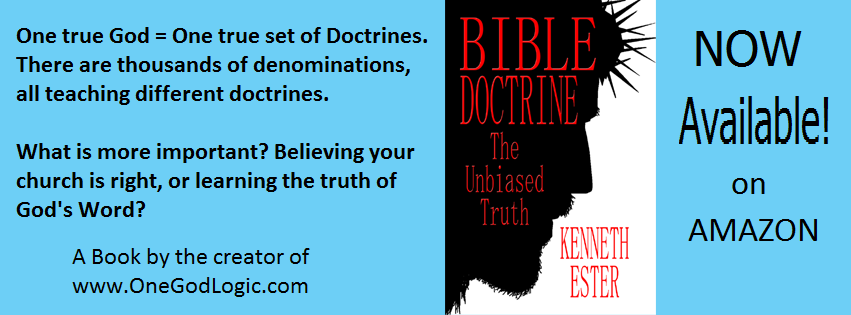Article by: Kenneth J. Ester
Understanding - 1 Corinthians 6:9-10
1 Corinthians 6:9-10 (NASB)
9 Or do you not know that the unrighteous will not inherit the kingdom of God? Do not be deceived; neither fornicators, nor idolaters, nor adulterers, nor effeminate, nor homosexuals, 10 nor thieves, nor the covetous, nor drunkards, nor revilers, nor swindlers, will inherit the kingdom of God.
Quite often this scripture is quoted to support that someone who sins will go to hell. Christians who tend to attack homosexuals for their sin love to quote this scripture as proof that homosexuals are going to hell because they are gay. The problem is, that is not what this scripture is saying.
The one thing that stands out the most to me is the simple fact that they always stop reading after verse 10. Which is a really bad thing considering that verse 11 is the key to understanding the truth to this scripture.
11 Such were some of you; but you were washed, but you were sanctified, but you were justified in the name of the Lord Jesus Christ and in the Spirit of our God.
Now to really understand what is happening, you need to understand two things here. First is that Paul wrote this letter to a church. To other believers. Second is that Paul does not list different sins that send us to hell. He lists different types of sinners.
So Paul writes to other believers and tells them that these different types of sinners are going to hell. Then in verse 11, Paul tells them, "Such were some of you...". It is important to realize that he uses the past tense term "were". This means they were these types of sinners but they are no longer. Now consider what John tells us...
1 John 1:8 (NASB)
8 If we say that we have no sin, we are deceiving ourselves and the truth is not in us.
Notice that John uses the word "we" and "ourselves" and "us". He is clearly including himself in this message. He is plainly telling us that anyone who says they dont sin is a liar. If John is admitting that even he still sins, and is telling us that everyone still sins, how can we possibly believe that someone who is saved never sins?
The truth is everyone sins. The Word of God says that clearly. Why is that important? Because if everyone still sins, then how is it that Paul is saying that the believers he was writing to are no longer those sinners he listed off? That is the final key to understanding the truth to this scripture. When the Bible talks about sinners, it is not using the word as a noun.
Most Christians see the word sinner as a noun. If someone sins, then they must be a sinner. But that is not how the Bible uses the word. In the Word of God, a "sinner" is not a noun, but it is a title. A sinner is anyone who has rejected Jesus as their Lord and Savior. Anyone who believes with all their heart that Jesus is Lord and Savior, is not a sinner. THey are a saint, a believer, the righteous, but they are not a sinner.
So going back to Pauls message to the church in Corinth, this is what he is telling them...
"The many sinners of this world will not inherit the Kingdom of God because they have not accepted Jesus. You used to be these sinners yourself but you are no longer these sinners. You have been washed clean and justified and sanctified because you believe in Jesus as your Lord and Savior."
It is also important to understand why Paul is writing this. If you read from the beginning of the chapter, you find that he is condemning the church because they have lawsuits against one another. Instead of dealing with their problems within the church, they were taking their problems to secular courts. Paul was telling them that the day will come when we will be the judges. We will even judge angels. We should not be turning to the world to judge our brethren. Then he goes on to clarify that the world is full of sinners but we are no longer these sinners. We have been washed clean. We should be taking our problems to those in the church to decide what to do.
The very last thing Paul is trying to do is tell us anyone who commits these sins will go to hell. The only reason this scripture is so often used to support that belief is because Christians love to pick and choose verses and interpret them to support their own beliefs even if it means they need to take the verse out of context.
9 Or do you not know that the unrighteous will not inherit the kingdom of God? Do not be deceived; neither fornicators, nor idolaters, nor adulterers, nor effeminate, nor homosexuals, 10 nor thieves, nor the covetous, nor drunkards, nor revilers, nor swindlers, will inherit the kingdom of God.
Quite often this scripture is quoted to support that someone who sins will go to hell. Christians who tend to attack homosexuals for their sin love to quote this scripture as proof that homosexuals are going to hell because they are gay. The problem is, that is not what this scripture is saying.
The one thing that stands out the most to me is the simple fact that they always stop reading after verse 10. Which is a really bad thing considering that verse 11 is the key to understanding the truth to this scripture.
11 Such were some of you; but you were washed, but you were sanctified, but you were justified in the name of the Lord Jesus Christ and in the Spirit of our God.
Now to really understand what is happening, you need to understand two things here. First is that Paul wrote this letter to a church. To other believers. Second is that Paul does not list different sins that send us to hell. He lists different types of sinners.
So Paul writes to other believers and tells them that these different types of sinners are going to hell. Then in verse 11, Paul tells them, "Such were some of you...". It is important to realize that he uses the past tense term "were". This means they were these types of sinners but they are no longer. Now consider what John tells us...
1 John 1:8 (NASB)
8 If we say that we have no sin, we are deceiving ourselves and the truth is not in us.
Notice that John uses the word "we" and "ourselves" and "us". He is clearly including himself in this message. He is plainly telling us that anyone who says they dont sin is a liar. If John is admitting that even he still sins, and is telling us that everyone still sins, how can we possibly believe that someone who is saved never sins?
The truth is everyone sins. The Word of God says that clearly. Why is that important? Because if everyone still sins, then how is it that Paul is saying that the believers he was writing to are no longer those sinners he listed off? That is the final key to understanding the truth to this scripture. When the Bible talks about sinners, it is not using the word as a noun.
Most Christians see the word sinner as a noun. If someone sins, then they must be a sinner. But that is not how the Bible uses the word. In the Word of God, a "sinner" is not a noun, but it is a title. A sinner is anyone who has rejected Jesus as their Lord and Savior. Anyone who believes with all their heart that Jesus is Lord and Savior, is not a sinner. THey are a saint, a believer, the righteous, but they are not a sinner.
So going back to Pauls message to the church in Corinth, this is what he is telling them...
"The many sinners of this world will not inherit the Kingdom of God because they have not accepted Jesus. You used to be these sinners yourself but you are no longer these sinners. You have been washed clean and justified and sanctified because you believe in Jesus as your Lord and Savior."
It is also important to understand why Paul is writing this. If you read from the beginning of the chapter, you find that he is condemning the church because they have lawsuits against one another. Instead of dealing with their problems within the church, they were taking their problems to secular courts. Paul was telling them that the day will come when we will be the judges. We will even judge angels. We should not be turning to the world to judge our brethren. Then he goes on to clarify that the world is full of sinners but we are no longer these sinners. We have been washed clean. We should be taking our problems to those in the church to decide what to do.
The very last thing Paul is trying to do is tell us anyone who commits these sins will go to hell. The only reason this scripture is so often used to support that belief is because Christians love to pick and choose verses and interpret them to support their own beliefs even if it means they need to take the verse out of context.




